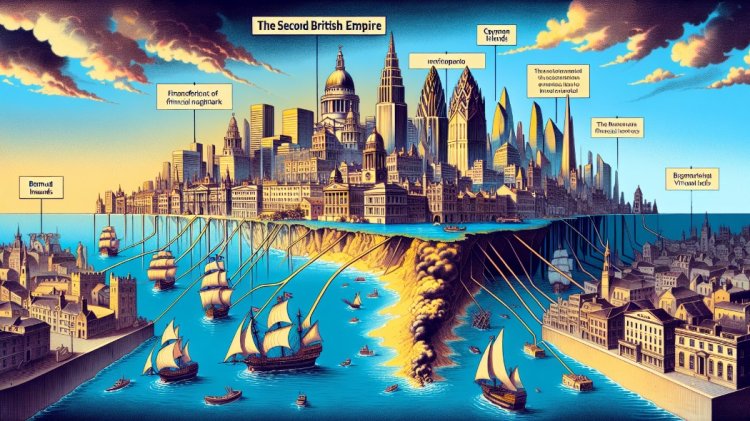The Second British Empire: Unveiling the Offshore Web of Dirty Money
Unmask the hidden currents of the Second British Empire! Dive into the shadowy offshore web where dirty money thrives, fueled by colonial legacy and financial secrecy. This exposé illuminates the dark underbelly of global finance, leaving no stone unturned in the pursuit of accountability.

Introduction
The concept of the Second British Empire revolves around the offshore financial networks established by bankers, lawyers, and accountants in the City of London. These networks were created as a response to the decline of the British Empire, allowing the elites to continue capturing wealth from around the world. The offshore web has had a major impact on global structures, shaping the world in which we live today. Understanding the history and development of this offshore system is crucial to comprehending its influence.
This blog will provide an overview of the structure and length of the content. It will delve into the significance of the Second British Empire and its focus on offshore financial networks. The blog will analyze the impact of these networks on global structures and highlight the importance of understanding their history and development. It aims to provide valuable information on the offshore web and its influence on the world.
The Decline of the British Empire
The decline of the British Empire had a significant impact on the elites and the overall structure of the empire. As countries gained independence one by one, the British elites faced a loss of wealth, privileges, and power. In search of a new role, they turned to the world of finance, a realm they were already familiar with.
At its height, the City of London was the largest financial center in the world and the heart of the British Empire. The empire's countries used the British pound and relied on the city for financial transactions. However, as the empire declined, so did the city's prominence. Threatened by the loss of commercial interests, the city started losing its position.
To adapt to this changing landscape, the British elites established offshore financial networks in former colonies of the British Empire. These jurisdictions, known as secret offshore jurisdictions, provided the elites with a way to continue capturing wealth from around the world. The elites, including bankers, lawyers, and accountants, flocked to places like the Cayman Islands, Bermuda, and the British Virgin Islands and created elaborate networks of offshore financial services.
These offshore networks allowed the elites to transform colonial power into financial power. They offered a way to evade regulations, hide wealth, and engage in illicit activities such as money laundering and tax evasion. The offshore web became a safe haven for individuals, crime syndicates, and corporations to store and move their funds outside the reach of authorities.
This transformation from colonial power to financial power has shaped the current world structure. The offshore networks have facilitated the flow of illicit capital, drained resources from developing nations, and perpetuated economic inequality. The offshore system has also allowed the elites to maintain their influence and control over global finance, further consolidating their power.
Understanding the history and development of the British Empire's decline and the rise of the offshore financial system is crucial to comprehending the influence and impact of these networks on the world today. It sheds light on the mechanisms that perpetuate global inequality and the challenges faced by developing nations in achieving economic stability and growth.
The Rise of the City of London
The City of London, also known as the financial heart of the Empire, played a crucial role in the Second British Empire. At its height, the city was the largest financial center in the world and the heart of the British Empire's financial system. The empire's countries relied on the city for financial transactions and used the British pound as their currency.
However, as the Empire declined, so did the city's prominence. The loss of commercial interests and the independence of countries within the empire threatened the city's position. In response to this changing landscape, the British elites established offshore financial networks in former colonies of the British Empire.
These secret offshore jurisdictions, such as the Cayman Islands, Bermuda, and the British Virgin Islands, provided a way for the elites to continue capturing wealth from around the world. The city's decline was offset by the creation of these offshore financial networks, which allowed the elites to transform colonial power into financial power.
These offshore networks played a significant role in the global financial system. They offered a way to evade regulations, hide wealth, and engage in illicit activities such as money laundering and tax evasion. The creation of the Euromarket in London further solidified the city's role in the global financial market.
Despite the decline of the British Empire, the City of London has maintained its influence and control over global finance. It continues to be a major player in the global financial market, with numerous banks and financial institutions operating within its jurisdiction.
The rise of the City of London as a global financial center is a testament to the adaptability and resilience of the British elite. They were able to navigate the changing world order and establish a new system that allowed them to maintain their wealth and power.
Today, the City of London remains a key player in the global financial market, but its history as the financial heart of the Empire is a reminder of the complex and interconnected nature of the offshore financial system.
Creation of Offshore Jurisdictions
The emergence of offshore jurisdictions can be traced back to the decline of the British Empire. As countries gained independence, the British elites faced a loss of wealth and power. To adapt to this changing landscape, they established offshore financial networks in former colonies of the British Empire.
Offshore jurisdictions are characterized by their purpose of providing a way for individuals, crime syndicates, and corporations to store and move their funds outside the reach of authorities. These jurisdictions offer a range of financial services, including banking, trust services, and company formation. The main characteristics of offshore jurisdictions are their secrecy and lax regulations.
British overseas territories, such as the Cayman Islands, Bermuda, and the British Virgin Islands, have played a significant role in offshore finance. These territories have provided a safe haven for individuals and corporations to hide their wealth and engage in illicit activities such as money laundering and tax evasion. The British connection has brought credibility and stability to these jurisdictions, making them attractive to investors.
Secrecy and regulation in offshore jurisdictions have been a subject of debate. While secrecy has been a key feature of these jurisdictions, there has been increasing pressure from international bodies to improve transparency and combat financial crimes. As a result, many offshore jurisdictions have introduced measures to enhance regulation and comply with international standards.
The relevance of offshore jurisdictions in shaping the current financial system cannot be underestimated. These jurisdictions have facilitated the flow of illicit capital, drained resources from developing nations, and perpetuated economic inequality. They have also allowed the elites to maintain their influence and control over global finance.
The Role of the City of London
The City of London, also known as the financial heart of the Empire, played a crucial role in the Second British Empire. It is a unique and intriguing entity with its own characteristics and status.
Introduction to the unique characteristics of the City of London
The City of London is a separate entity within the larger city of London, administered by the Corporation of the City of London. It is an ancient financial district with a long history and unique political and legal status. The city has its own executive, the Lord Mayor, and is governed by its own set of laws and regulations.
An explanation of the unique political and legal status of the city
The City of London has had a distinct legal and political status since the time of William the Conqueror in 1066. It was one of the few parts of England that William did not conquer, and it was allowed to continue functioning autonomously. To this day, the city is not subject to many of the laws and regulations that govern the rest of the UK.
Overview of the power and influence of the Corporation of the City of London
The Corporation of the City of London is a private company that acts as the local government for the city. It has its own police force and courts. The Lord Mayor, who is selected from the medieval guild masters, serves as the executive of the ity. The corporation has a significant amount of power and influence in shaping the policies and regulations of the city.
Discussion of the relationship between the city and the British government
The relationship between the City of London and the British government is complex. While the city has its own separate governance, it is still subject to the overall authority of the British government. The British government has the power to appoint governors and high officials in the city, and it has veto power over local legislation. However, the city also has a level of autonomy in its decision-making and can influence British politics and policies.
Relevance of the city's power in shaping British politics and policies
The power and influence of the City of London have had a significant impact on shaping British politics and policies. The city has been able to shape regulations and legislation in its favor, particularly in the financial sector. Its financial power and influence have allowed it to maintain its position as a major player in the global financial market, attracting banks and financial institutions from around the world.
The city's power and influence have also had broader implications for global finance and the economy. The offshore financial networks established by the city have facilitated the flow of illicit capital, contributed to economic inequality, and drained resources from developing nations. Understanding the role of the city is crucial to comprehending the influence and impact of these networks on the world today.
The Impact on Global Finance
The offshore financial networks established by bankers, lawyers, and accountants in the City of London have had a significant impact on global capital flows. These networks, created in response to the decline of the British Empire, have shaped the world we live in today.
Offshore jurisdictions, such as the Cayman Islands, Bermuda, and the British Virgin Islands, have played a major role in facilitating tax evasion. These jurisdictions provide a way for individuals, crime syndicates, and corporations to store and move their funds outside the reach of authorities. The secrecy and lax regulations of offshore jurisdictions have made them attractive for tax avoidance and illicit activities such as money laundering.
The magnitude of offshore wealth is staggering. It is estimated that around half of the global offshore wealth, which amounts to trillions of dollars, is managed through British offshore jurisdictions. This vast amount of wealth being hidden offshore has serious consequences for economies and societies worldwide.
The negative effects of offshore finance are particularly noticeable in developing nations. The flow of illicit capital out of these countries drains resources and prevents economic development. The elites in these countries, including politicians and businesspeople, often use offshore jurisdictions to hide their wealth and evade taxes, further exacerbating income inequality.
Offshore finance perpetuates global inequality by allowing the elites to maintain their influence and control over the global financial system. The offshore networks created by the City of London and other financial centers continue to facilitate the flow of illicit capital, perpetuate economic inequality, and drain resources from developing nations.
The impact of offshore finance on global structures is far-reaching. It has allowed the elites to transform colonial power into financial power, maintaining their wealth and control over global finance. The offshore web has facilitated the flow of illicit capital, drained resources from developing nations, and perpetuated economic inequality, all while ensuring the continued influence and control of the elite.
Resistance and Calls for Change
Resistance against offshore finance has been growing in recent years, with activists and organizations calling for greater regulation and transparency in the global financial system. These efforts highlight the need to address the challenges posed by offshore finance and ensure a more equitable and accountable system.
One key aspect of this resistance is the push to establish a global tax authority. Advocates argue that a global tax authority would help combat tax evasion and ensure that multinational corporations and wealthy individuals pay their fair share of taxes. By coordinating tax policies and sharing information, a global tax authority could help close tax loopholes and prevent the shifting of profits to low-tax jurisdictions.
Regulating offshore finance presents several challenges. One major obstacle is the secrecy and lax regulations of offshore jurisdictions. These jurisdictions often provide a safe haven for individuals and corporations to hide their wealth and engage in illicit activities such as money laundering and tax evasion. Overcoming this challenge requires international cooperation and the establishment of strong regulatory frameworks.
Whistleblowers and leaks have played a crucial role in exposing offshore networks and bringing attention to their illicit activities. The release of documents such as the Panama Papers and the Paradise Papers has shed light on the extent of offshore finance and the individuals and corporations involved. Whistleblowers and journalists have played a vital role in uncovering the truth and holding those responsible accountable.
Ongoing efforts to combat offshore finance are crucial in addressing the issues of economic inequality, capital flight, and tax evasion. By increasing transparency, closing loopholes, and regulating offshore jurisdictions, it is possible to create a more equitable and accountable global financial system. These efforts require international cooperation, strong regulatory frameworks, and a commitment to combating illicit financial activities.
Conclusion
In conclusion, this blog has provided an overview of the Second British Empire and its offshore web. It has discussed the decline of the British Empire and the rise of offshore financial networks in former colonies. It has also examined the role of the City of London and the creation of offshore jurisdictions.
The offshore web has had a significant impact on global structures, perpetuating economic inequality and facilitating illicit activities such as tax evasion and money laundering. It has allowed the elites to maintain their influence and control over global finance. Understanding the history and development of this offshore system is crucial to comprehending its enduring impact.
Greater transparency and regulation are necessary to address the challenges posed by offshore finance. Efforts to establish a global tax authority and implement stronger regulatory frameworks are essential in combating tax evasion and ensuring a more equitable and accountable global financial system.
The enduring impact of the Second British Empire is evident in the continued influence of the City of London and other financial centers. The offshore networks established by bankers, lawyers, and accountants have shaped the flow of capital and perpetuated economic inequality. It is vital to continue advocating for transparency and regulation to create a more equitable global financial system.
Overall, understanding the offshore web and its history is crucial to comprehending the influence and impact of these networks on the world today. By promoting transparency and regulation, we can work towards a more equitable and accountable global financial system.
The Second British Empire and its offshore web have left an enduring impact on global finance. It is up to us to advocate for greater transparency and regulation to address the challenges posed by offshore finance and ensure a more equitable world.
Let us work towards a future where the offshore web is understood, regulated, and accountable.
FAQ
Here are some frequently asked questions about the Second British Empire and offshore finance:
What is the Second British Empire?
The Second British Empire refers to the offshore financial networks established by bankers, lawyers, and accountants in the City of London. These networks were created as a response to the decline of the British Empire, allowing the elites to continue capturing wealth from around the world.
What are offshore jurisdictions, and why are they significant?
Offshore jurisdictions are territories, such as the Cayman Islands, Bermuda, and the British Virgin Islands, that offer favorable financial regulations and tax incentives. They are significant because they provide a way for individuals, crime syndicates, and corporations to store and move their funds outside the reach of authorities, facilitating tax evasion and illicit activities.
How does the City of London play a role in the offshore web?
The City of London, as the financial heart of the Empire, played a crucial role in the establishment of offshore financial networks. At its height, the city was the largest financial center in the world and the heart of the British Empire's financial system. The decline of the British Empire led to the creation of offshore financial networks in former colonies, which allowed the elites to continue capturing wealth.
What are the consequences of offshore finance for global inequality?
Offshore finance perpetuates global inequality by allowing the elites to maintain their influence and control over the global financial system. The flow of illicit capital out of developing countries drains resources and prevents economic development, while the elites use offshore jurisdictions to hide their wealth and evade taxes, further exacerbating income inequality.
What efforts are being made to combat offshore finance?
Efforts to combat offshore finance include calls for greater regulation and transparency in the global financial system. Advocates propose establishing a global tax authority to combat tax evasion and close loopholes. Whistleblowers and leaks have also played a crucial role in exposing offshore networks and bringing attention to their illicit activities. International cooperation, strong regulatory frameworks, and a commitment to combating illicit financial activities are essential in addressing the challenges posed by offshore finance.



 admin
admin 










